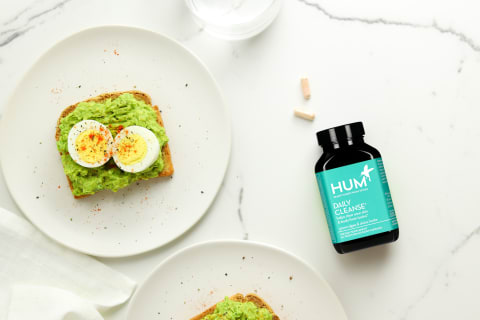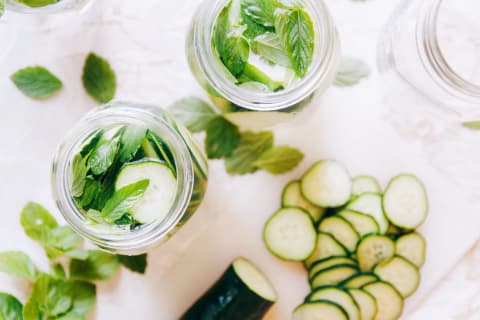Advertisement

The Skin Smoother: Carrot
Snacking on carrots can seriously supplement your skincare routine—the nutrient-dense veg is very high in beta-carotene, the carotenoid that the body converts into vitamin A, which contains antioxidants to protect from environmental stressors and helps keep skin smooth1. That's a big deal because bioavailable vitamin A only exists in animal products like egg yolks and cod liver oil. A small carrot alone delivers almost 300 percent of your daily vitamin A. For a good dose of it, plus a boost of vitamin C, add a cup of carrot juice to your smoothie, or make this carrot-ginger juice for healthy skin.
The Skin Detoxifier: Algae

Landside greens don’t get all the glory. When it comes to skin, there are two forms of freshwater algae to know: spirulina and chlorella. High in antioxidants, which prevent our cells from aging, spirulina gets its blue hue from a protein called phycocyanin, which packs anti-inflammatory and immune boosting benefits. Its green cousin chlorella is also an antioxidant machine (thanks to its chlorophyll) that helps fight inflammation2 with B vitamins, magnesium, and zinc. Green algae is perhaps most commonly known as a detoxifier for its ability to bind to skin-damaging heavy metals and remove them from the body. But we can’t digest chlorella’s hard cell wall, so to reap its skin-protecting benefits, it’s best to take this oceanic superfood as a supplement. HUM Nutrition capsules both organic chlorella and spirulina into its Daily Cleanse supplement—a daily formula designed to detox and improve the skin.
The Skin Protector: Rose
The classic bud is not just a beautiful perennial. Rose water and oil have been used for centuries as a natural remedy and a common ingredient in Middle Eastern, Indian, and Chinese cooking and teas. Now that its antiseptic and antioxidant properties3 have been backed up in scientific studies, the wellness world is coming up roses: the skin-calming ingredient is considered an adaptogen for its balancing effects to both the body and the mind, and it’s popping up in everything from nut milk to biodynamic chocolate to modern beauty waters. Make your own skin quencher with this recipe.
The Skin Moisturizer: Avocado
It’s all about the healthy fats in avocados. Thanks to how deeply and gently they hydrate dry, irritated skin, avocado has shown up on just about every kind of skincare product from exfoliators to sunscreens. Plus, the omega-3 fatty acids found in avocados strengthen the cell membrane of the epidermis, the skin’s outer layer, meaning it’s a powerful nutrient for smooth, vibrant skin. And since it’s already loaded with skin-nourishing minerals, vitamins, and the good fats, if you’ve got an avocado, you’ve got a natural moisturizing face mask in a few seconds flat. Try this DIY avocado mask for glowing skin, and this one to treat dry skin, hair, and scalp.
The Skin Brightener: Amla
The amla fruit, a.k.a. Indian gooseberry, has long been considered a healing ingredient in ayurveda and other eastern medicinal practices to support digestion and immunity. Amla actually translates to words like “mother,” “nurse,” and “immortality” in Sanskrit, and here’s why: These sour, plump green fruits are known for their super-high levels of vitamin C4 and polyphenols, which are potent plant-based antioxidants that help slow down aging and repair sun damage. And you might find it in more skincare products than grocery stores: In HUM Nutrition’s Glow Sweet Glow vegan gummies, amla is paired with skincare heavy hitters like moisturizing hyaluronic acid and collagen, which promotes youthful, supple skin, plus an extra boost of vitamins C and E for bright, radiant skin. And the delicious (best) part is that it tastes like tangerines.
The Skin Hydrator: Cucumber

Don’t be fooled by the fact that cucumbers are 96 percent water. Besides providing a surge of hydration, cucumbers are chock full of flavonoids and antioxidants that help decrease swelling, redness, and irritation on skin whether they’re eaten or used on your skin topically. (And its high water content also means cucumbers are great for those with sensitive skin.) Try this DIY soothing mask made with cucumber and aloe, or turn one large cucumber into refreshing popsicles with coconut milk and lime in one of the most delicious ways to get glowing skin.
The Skin Soother: Mint
If you open up your medicine cabinet, there’s a good chance that some of the products contain “menthe,” or mint. The cooling herb is known for its therapeutic and astringent properties that help soothe skin ailments from mosquito bites to acne. Mint is actually rich in salicylic acid, which you’ve probably used if you’ve ever had to battle a few stubborn blemishes, as well as oil-reducing, inflammation-fighting vitamins A and C, and skin-brightening vitamin B.
